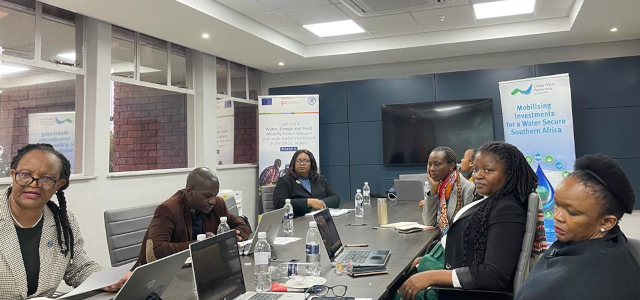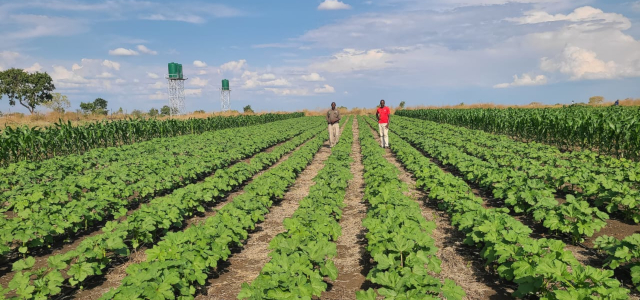This milestone has been reached following various stages of technical support that GWPSA provided to SADC member states. GWPSA provided the support through the Southern Africa Development Community EU-funded SADC Nexus Dialogue Project whose overall objective is institutionalising the WEFE Nexus approach in governance structures at the national and regional levels and supporting investment decisions for water, energy, and food security in the SADC region.
GWPSA supported SADC in helping 15 member states hold national dialogues where they identified priority investment projects that could be taken further for bankability and mobilising financing for implementation.
“Implementation of the SADC Water, Energy, Food, & Environment (WEFE) Nexus approach in the region has supported the acceleration, adoption, and uptake of the WEF Nexus approach at national and regional levels. As part of our sustainability strategy to continue the implementation of the nexus approach in the region, the programme identified and prioritised investment opportunities and developed funding proposals targeting GEF, GCF, Adaptation Fund, and IKI.
“During the national dialogues, we identified a pipeline of investment opportunities and established WEF Technical Working Groups to support the development of funding proposals/concept notes. THE NRDP then supported resource mobilisation through developing funding proposals and integrating the identified investments into other regions such as the SADC GGWI being spearheaded by UNCCD and the Regional Infrastructure Development Master Plan,” explained Dr. Annah Ndeketeya, Programme Officer – GWPSA.
GWPSA has partnered with several partners to support the development of funding proposals. Some of the key targeted funders include the Adaptation Fund, GCF, GEF, IKI, SEFA, and FFEM. The projects aim to strengthen the institutional capacity for developing information management and knowledge management tools, promoting demonstration projects and promoting gender-responsive measures.
Below are some of the projects:
- Botswana: Improving water, energy and food security through climate resilient adaptation. The targeted funder is the Adaptation Fund
- Lesotho: Climate Resilient Water Resources, targeting GCF as the funder
- South Africa: WEF Nexus approach for climate resilience through the reduction of landscape degradation in South Africa, targeting GCF as the funder.
- Tanzania & Zambia: Promoting Agri-PV, targeting IKI as the funder
- Zimbabwe: Masterplan for Condo-Chitowe Dam project, targeting AWF
- Tanzania: Integrated Landscape Management for Sustainable Ecosystem Services and Community Livelihoods in Wami-Ruvu River Basin, targeting GEF as the funder
- DRC: Project Benaleka, targeting FFEM
There are also four multi-country project proposals, namely:
- IncoMaputo targeting GEF as a funder
- RUVUMA targeting GEF
- SADC SIDS also targeting GEF
- LIMCOM targeting the Adaptation Fund
The case of Botswana
On Tuesday, 31 October, Botswana held its WEFE Technical Working Group Validation Workshop for the Adaptation Fund Concept Note on “Strengthening climate-resilient water, food, and energy systems in Botswana through promoting natural resource use efficiency.”
Botswana is targeting a funding amount of USD 10 million for the WEFE project. If funding is approved, GWPSA and the Food and Agriculture Organization will support the executing agency, Bostwana’s Ministry of Agricultural Development and Food Security, in implementing the project.

Participants at Botswana’s WEFE Technical Working Group Validation Workshop developing a concept note for submission to the Adaptation Fund
Making a presentation during the workshop, Mr. René Schieritz, GWP Programme Specialist on Water and Climate Resilience, explained that the project will address a number of barriers to building climate resilience, including limited technical and technological capacity in rural communities for achieving social, economic, and environmental sustainability through climate-resilient land and water resource management and diversification of livelihoods, limited institutional coordination in the human system driving WEFE security, limited knowledge and applied research for evidence-based resource management and decision-making and inadequate financial sustainability for building climate resilience.
“The 4 components of the concept note include strengthening the enabling environment for implementing and upscaling gender-responsive, climate-resilient management of land and water resources, improving the knowledge base for targeted WEFE interventions through demonstrations in priority areas, facilitating access to adaptation finance, and strengthening awareness of climate risks and the importance of a climate resilient WEFE nexus approach in Botswana,” explained Mr. Schieritz.
More specifically on Component 3, facilitating access to adaptation finance OKACOM and IFAD expressed the same views on the need to build on innovative sustainable financing mechanisms to implement resilience interventions linked to funds such as the Cubango-Okavango River Basin (CORB) Fund. Mr. Phera Ramoeli from OKACOM highlighted that “the possibility of integrating the CORB Fund into the Adaptation Fund to leverage grant resources into the CORB Fund that would provide for some of the interventions in Botswana such as small-scale water, food and energy security -including Improved community-based natural resource management”.
Ms. Edith Kirumba of IFAD welcomed these remarks from OKACOM and reiterated that further details need to be investigated on incorporating the CORB fund at the proposal development stage as these funds could see Botswana achieve enhanced livelihoods, improved ecosystem resilience and provision on equitable benefits.
Once the AF Concept Note is finalised, the Ministry of Environment and Tourism is envisaged to produce an Endorsement Letter then the implementing authority, the International Fund for Agricultural Development (IFAD) will submit the proposal to the Adaptation Fund this month.
